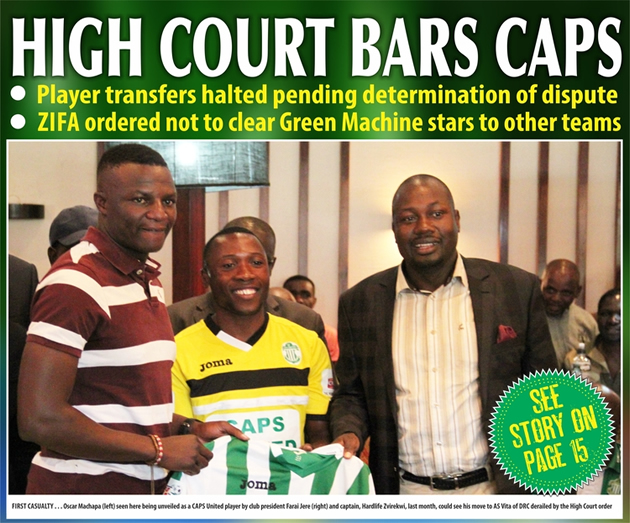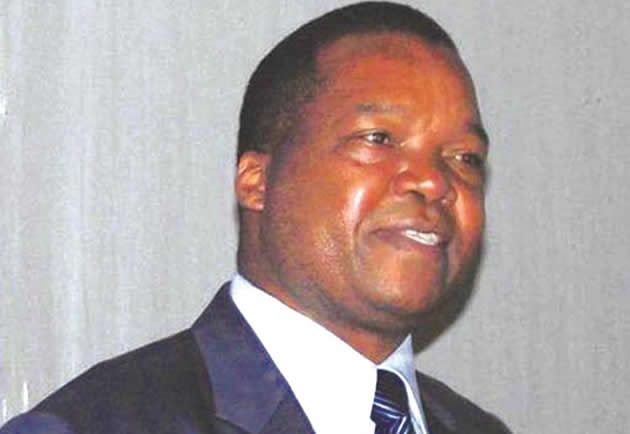High Court bars CAPS transfers

 Robson Sharuko Senior Sports Editor
Robson Sharuko Senior Sports Editor
THE High Court has provisionally barred CAPS United from executing any transfers of their players, to either local and foreign clubs, pending the determination of a dispute between the Green Machine and a Harare businessman who handed the Premiership giants a $55 000 loan two years ago.
ZIFA have also been barred, in the interim, from issuing clearances to CAPS United players, who have been secured by foreign teams, with experienced midfielder, Oscar Machapa, who is on the verge of moving to Democratic Republic of Congo heavyweights, AS Vita, set to be the first casualty.
However, by upholding the High Court order, ZIFA could be in violation of the recent decision by FIFA to outlaw third-party investors having rights in transfer of players, a decision which was upheld by a Belgian court last month, which rejected arguments that the ban was a breach of European Union competition laws.
“FIFA takes this opportunity to reiterate its confidence in the legality of the ban on third party ownership, which is indispensable for preserving clubs’ and players’ independence, and for ensuring the integrity of matches and competitions,” the world football governing body said in a statement released after the dismissal of the case brought by lawyers for the Doyen Sports Investments Fund and Belgian Second Division club Seraing United.
By deciding to ignore the provisional High Court order, in the dispute involving CAPS United and Harare businessman, Nobert Chawira, using the FIFA position on third party ownership as a shield, ZIFA could find itself in contempt of court, exposing their officials to possible sanctions in this country.
Chawira took his case to the High Court after CAPS United failed to pay him back the $55 000 he loaned the club, two years ago, at a time when the Green Machine were in financial depression. Justice Owen Tagu issued a provisional order on Wednesday last week outlawing the transfer of players from CAPS United to local, or foreign clubs, until the determination of the dispute between the Green Machine and Chawira.
The judge ordered that “pending the finalisation of the dispute between the Applicant (Chawira) and 1st Respondent (CAPS United) under the summons case, 2nd Respondent (ZIFA) be barred and interdicted from issuing any clearance certificates in respect of 1st Respondent’s (CAPS United) players.”
CAPS United and ZIFA have 10 days to oppose the provisional order.
“If you do not file an opposing affidavit within the period specified above, this matter will be set down for hearing in the High Court at Harare without further notice to you and will be dealt with as an unopposed application for confirmation of the provisional order,” read the judgment.
“If you wish to have the provisional order changed or set aside sooner than the rules of Court normally allow and can show good cause for this, you should approach the Applicant/Applicant’s legal practitioner to agree, in consultation with the Registrar, on a suitable hearing date.
“If this cannot be agreed or there is a great urgency, you make a Chamber application, on notice to the Applicant, for directions from a Judge as to when the matter can be argued.”
CAPS United and Chawira last month tried to resolve the case out of court with the club paying the Harare businessman in three tranches of $20 000, before July 31 this year, $15 000, before August 30 this year, $10 000 before September 31 this year and a further $10 000 before October 30 this year.
“The parties herein agree that should the 1st Respondent (CAPS United) fail to pay any instalment as and when it becomes due, then the whole amount, which remains outstanding at the time of default, shall become due and payable to the Creditor (Chawira) who shall proceed to register the deed without further notice to the Defendant and shall be entitled to claim costs on a legal practitioner and client scale,” read the draft agreement.
“The parties hereto agree that should be Debtors fail to pay any instalment as and when it becomes due, interest thereon shall begin to run and accrue at the rate of 5% from the date of the signature.
“That the parties agree that the Creditor shall withdraw all his matters against the Defendant under Case Numbers 6737/15 and 6738/15 in accordance with this Deed of settlement and that the principal debtor shall withdraw its appearance to defend and its related offences.”
The draft agreement, though, was not signed between the two parties.
The High Court order is likely to present a huge test to the ZIFA authorities given the recent developments, in FIFA, where third party influence in player transfers were outlawed with the FIFA regulations on status and transfer of players clearly stating, in Article 18b, that “no club shall enter into a contract which enables any other party to that contract or any third party to acquire the ability to influence in employment and transfer-related matters its independence, its policies or the performance of its teams.”
Failure to respect that, FIFA warns, “the FIFA Disciplinary Committee may impose disciplinary measures on clubs that do not observe the obligations set out in this article.”
Failing to execute the High Court order, using the FIFA regulations as a shield, could result in contempt of court charges being preferred against the ZIFA officials.
The Herald revealed last year that CAPS United used their players as security and gambled on potential earnings from transfers, at home and abroad, as collateral, to unlock a raft of interest-free loans from Chawira, to service their operations.
Twine Phiri, then the majority shareholder and president at CAPS United, and club chief executive, Joe Makuvire, signed the agreement with Chawira.
The guarantee was for funds not exceeding $100 000 and, crucially, CAPS United undertook to “cede the club’s rights to any transfer earnings that may be realised for the local or international transfer of players in the club’s books, cede rights to any prize money that may be earned for the duration and quantum of indebtedness to the creditor.
“The club, hereby, consents and expressly empowers the creditor to recover his debt in part, or in full, from any further transfer earnings.
“The club undertakes to service all debts under this guarantee by 28 February 2014 and shall ensure a deliberate effort to export players so as to meet obligations covered by this guarantee by due date.
“The ceded rights are limited strictly to amounts owed by the club to the creditor and fully acknowledged by both parties, the cession expires on full payment of all funds owed, the cession acts as a guarantee and entitles the creditor to future earnings in respect of the debt only and, in no way, does it communicate or translate to ownership of players and/or their rights.”
The shareholding structure at CAPS United has since changed with Harare businessman, Farai Jere, owning an 80 percent stake in the club while Phiri owns 20 percent.









Comments